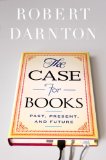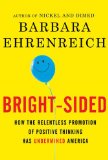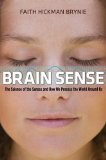October 20, 2009

The Case for Books: Past, Present, and Future by historian Robert Darnton (PublicAffairs, 2009).
(link for UK)
Product description from the publisher:
The invention of writing was one of the most important technological, cultural, and sociological breakthroughs in human history. With the printed book, information and ideas could disseminate more widely and effectively than ever before—and in some cases, affect and redirect the sway of history. Today, nearly one million books are published each year. But is the era of the book as we know it—a codex of bound pages—coming to an end? And if it is, should we celebrate its demise and the creation of a democratic digital future, or mourn an irreplaceable loss? The digital age is revolutionizing the information landscape. Already, more books have been scanned and digitized than were housed in the great library in Alexandria, making available millions of texts for a curious reader at the click of a button, and electronic book sales are growing exponentially. Will this revolution in the delivery of information and entertainment make for more transparent and far-reaching dissemination or create a monopolistic stranglehold?
In The Case for Books, Robert Darnton, an intellectual pioneer in the field of the history of the book and director of Harvard University’s Library, offers an in-depth examination of the book from its earliest beginnings to its shifting role today in popular culture, commerce, and the academy. As an author, editorial advisor, and publishing entrepreneur, Darnton is a unique authority on the life and role of the book in society. This book is a wise work of scholarship—one that requires readers to carefully consider how the digital revolution will broadly affect the marketplace of ideas.
See also:
More new releases in Books & Reading
Barnes & Noble’s upcoming ebook reader
Comments (0)
- culture,new books,reading
October 17, 2009

Buddha’s Brain: The Practical Neuroscience of Happiness, Love, and Wisdom by Rick Hanson with Richard Mendius (New Harbinger, 2009)
(link for UK)
Product description from the publisher:
Jesus, Moses, Mohammed, Gandhi, and the Buddha all had brains built essentially like anyone else’s, yet they were able to harness their thoughts and shape their patterns of thinking in ways that changed history. With new breakthroughs in modern neuroscience and the wisdom of thousands of years of contemplative practice, it is possible for us to shape our own thoughts in a similar way for greater happiness, love, compassion, and wisdom.
Buddha’s Brain joins the forces of modern neuroscience with ancient contemplative teachings to show readers how they can work toward greater emotional well-being, healthier relationships, more effective actions, and deepened religious and spiritual understanding. This book will explain how the core elements of both psychological well-being and religious or spiritual life-virtue, mindfulness, and wisdom-are based in the core functions of the brain: regulating, learning, and valuing. Readers will also learn practical ways to apply this information, as the book offers many exercises they can do to tap the unused potential of the brain and rewire it over time for greater peace and well-being.
Comments (2)
- consciousness,happiness,meditation,new books
October 16, 2009

Religious Experience Reconsidered: A Building-Block Approach to the Study of Religion and Other Special Things by Ann Taves (Princeton University Press, 2009)
(link for UK)
Product description from the publisher:
The essence of religion was once widely thought to be a unique form of experience that could not be explained in neurological, psychological, or sociological terms. In recent decades scholars have questioned the privileging of the idea of religious experience in the study of religion, an approach that effectively isolated the study of religion from the social and natural sciences. Religious Experience Reconsidered lays out a framework for research into religious phenomena that reclaims experience as a central concept while bridging the divide between religious studies and the sciences.
Ann Taves shifts the focus from “religious experience,” conceived as a fixed and stable thing, to an examination of the processes by which people attribute meaning to their experiences. She proposes a new approach that unites the study of religion with fields as diverse as neuroscience, anthropology, sociology, and psychology to better understand how these processes are incorporated into the broader cultural formations we think of as religious or spiritual. Taves addresses a series of key questions: how can we set up studies without obscuring contestations over meaning and value? What is the relationship between experience and consciousness? How can research into consciousness help us access and interpret the experiences of others? Why do people individually or collectively explain their experiences in religious terms? How can we set up studies that allow us to compare experiences across times and cultures?
Religious Experience Reconsidered demonstrates how methods from the sciences can be combined with those from the humanities to advance a naturalistic understanding of the experiences that people deem religious.
Comments (0)
- consciousness,culture,new books
October 13, 2009

Bright-sided: How the Relentless Promotion of Positive Thinking Has Undermined America by Barbara Ehrenreich (Metropolitan Books, 2009)
(link for UK)
Product description from the publisher:
A sharp-witted knockdown of America’s love affair with positive thinking and an urgent call for a new commitment to realism
Americans are a “positive” people—cheerful, optimistic, and upbeat: this is our reputation as well as our self-image. But more than a temperament, being positive, we are told, is the key to success and prosperity.
In this utterly original take on the American frame of mind, Barbara Ehrenreich traces the strange career of our sunny outlook from its origins as a marginal nineteenth-century healing technique to its enshrinement as a dominant, almost mandatory, cultural attitude. Evangelical mega-churches preach the good news that you only have to want something to get it, because God wants to “prosper” you. The medical profession prescribes positive thinking for its presumed health benefits. Academia has made room for new departments of “positive psychology” and the “science of happiness.” Nowhere, though, has bright-siding taken firmer root than within the business community, where, as Ehrenreich shows, the refusal even to consider negative outcomes—like mortgage defaults—contributed directly to the current economic crisis.
With the mythbusting powers for which she is acclaimed, Ehrenreich exposes the downside of America’s penchant for positive thinking: On a personal level, it leads to self-blame and a morbid preoccupation with stamping out “negative” thoughts. On a national level, it’s brought us an era of irrational optimism resulting in disaster. This is Ehrenreich at her provocative best—poking holes in conventional wisdom and faux science, and ending with a call for existential clarity and courage.
See also: Author’s website
Update 10/16 – Barbara Ehrenreich on the Daily Show:
Comments (0)
- culture,happiness,new books
October 11, 2009

Brain Sense: The Science of the Senses and How We Process the World Around Us by Faith Hickman Brynie (AMACOM, 2009)
(link for UK)
Product description from the publisher:
Have you ever wondered why you remember color images and scenes so much better than those in black and white? Or do you ponder why that first cup of morning coffee tastes better than anything you’ll have all day? The answer lies in the way our brains interpret and process the sights, smells, sounds, tastes, and touches that make up our lives. Brain Sense explores the latest research on brain function and the senses and offers fascinating new insights about what makes us tick. The book melds interviews with renowned scientists with stories of everyday experiences to illustrate how our brains process the world around us. Divided into parts, one for each sense, Brain Sense reveals:
• why what you eat and drink is not necessarily what you taste
• how we respond to pheromones
• how the body reacts to touch
• how music changes how the brain works
• the real truth about the sixth sense
• how the brain’s electrical responses affect hearing
Both enlightening and engaging, this book will help us more fully understand the elusive mysteries of the human brain.
See also: Author’s blog at Psychology Today
Comments (0)
- cognitive science,new books







